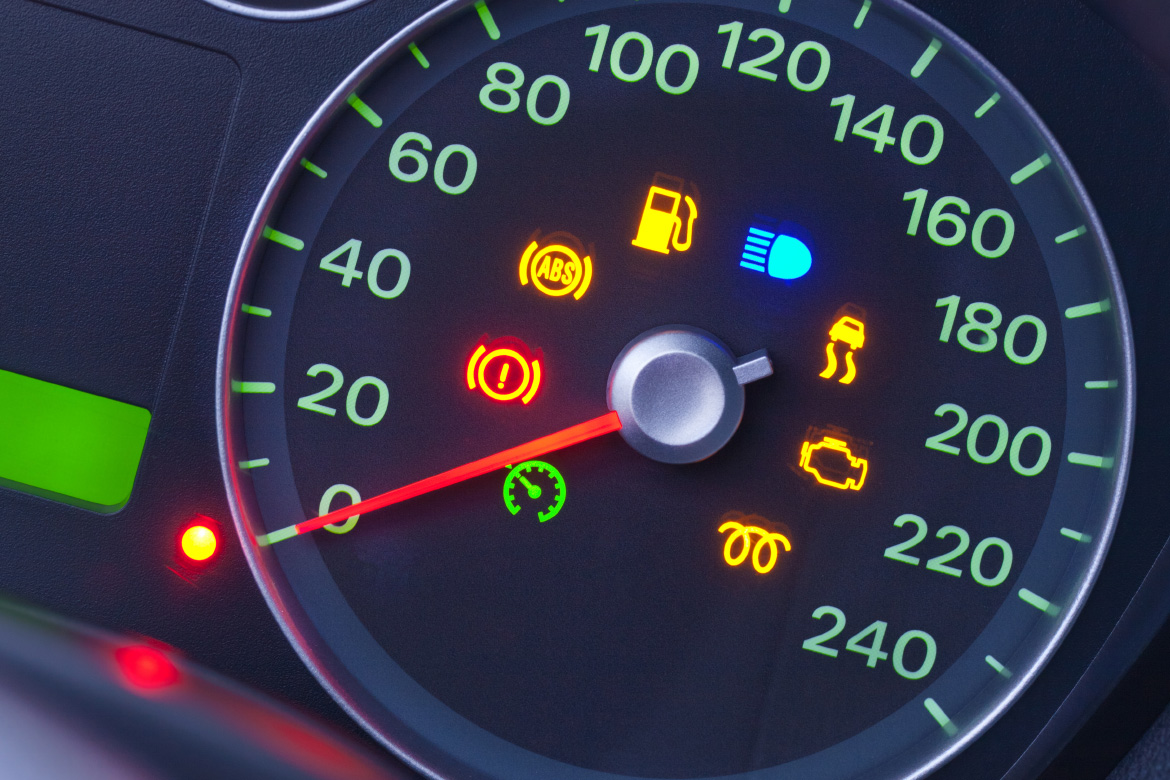Your vehicle is equipped with a slew of sensors that detect when something is wrong, but when a warning light pops up on your dashboard a lot of different feelings might ensue, like confusion, concern, and, let’s be honest, active ignoring.
We’re here with a guide to the most common dashboard warning lights to help you drive with confidence. These lights are essential indicators of your vehicle's health, offering vital clues to its safety and performance status. Knowing what these symbols mean and how to handle them can ensure your (and your vehicle’s) safety.
There are two things to keep in mind as you read our guide:
- Every vehicle has its quirks, so the symbols on your dashboard may vary in style or color from the ones on our list, so when in doubt, consult your owner’s manual.
- On most vehicles when initially started, all the warning lights will briefly illuminate as the system conducts a quick system checkup. As long as they turn off within a few seconds your vehicle should be operating properly.
Let’s get into it!
Check Engine
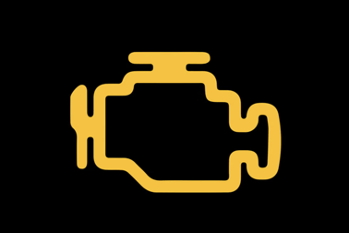
We’ll start with one of the most notorious warnings - the check engine light. It also happens to be one of the most ambiguous because it can indicate anything from an ill-fitting gas cap to more serious issues within the engine itself. If the light is not flashing, and you don’t notice any strange smells or sounds, you can continue to drive a moderate distance – ideally back home or to a CarShop location for a thorough service inspection.
If the light is red or flashing, stop driving immediately. This often indicates something more serious that could lead to severe and potentially costly damage to your engine.
In either case, an ASE-Certified technician, like the ones you’ll find at CarShop, are ready to help you with your diagnostic and repair needs.
Washer Fluid, Door Open, and Low Fuel
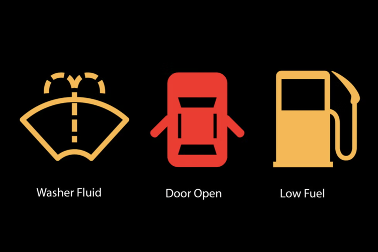
These are a few classics that you may see frequently lit up. The washer fluid indicator means your fluid needs to be topped up, which is especially important if you’re going to be driving in snowy or icy conditions.
The door open light means exactly that – a door is open on your vehicle. Just check your doors and trunk for secure closure and it should turn off. If all doors are secure, there may be an issue with the sensor system, in which case you can bring your vehicle in to get it fixed.
The fuel pump indicator pops up when your tank is dangerously close to empty – so fill up your fuel tank and you should be on your way. Bonus tip: there’s usually an arrow on either side of the little fuel pump icon, indicating which side of the vehicle has the gas flap.
Oil Pressure Warning
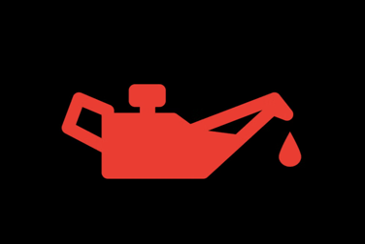
The oil pressure indicator, which looks like a leaky genie's lamp, indicates that the oil pressure in your vehicle is low. This could be caused by low oil levels or something more serious, like a leak. If you can, check the dipstick to see what your oil levels are. If they’re low, add oil or get an oil change to see if that resolves the issue. If that doesn’t do the trick, it’s wise to get the issue checked out by a professional as soon as possible to avoid big repair bills down the road.
Battery
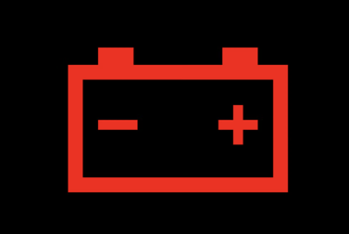
A battery alert light signals an issue with the vehicle’s charging system, possibly due to a failing alternator, loose battery connections, or other electrical component issues. Often, this light will turn on when your vehicle fails to start because of a flat battery. Pop your hood to check the battery terminals for corrosion or connection issues, and then consider bringing your vehicle in for a battery test.
Coolant Temperature
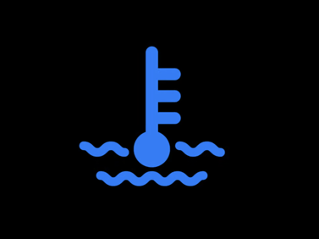
The warning light that looks like a thermometer bobbing in water indicates an issue with your coolant system – meaning that your engine is running too hot. This can be caused by a slew of things, from a broken water pump or low coolant levels to damage to the radiator itself.
If this light turns on while driving, pull over to let your engine cool down for a while. Like a blinking check engine light, this warning can indicate potentially serious issues, so you should bring your vehicle in for service as soon as possible. If your vehicle is exhibiting signs of a serious issue, such as steaming or smoking, you may want to call a tow service.
Transmission Temperature
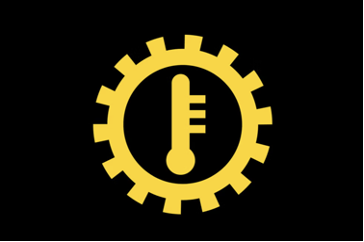
The thermometer in this light resides within a gear and indicates that the internal pieces of your transmission are getting too hot. Heavy towing, low transmission fluids, or issues with the inner pieces of the gearbox can all lead to transmission heating issues. If pulling over and giving your vehicle a break doesn’t resolve the issue, bring it into a CarShop service bay to diagnose and fix the issue.
Tire Pressure Monitoring System
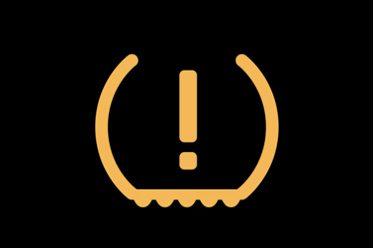
This indicator light symbolizes a tire tread against the road and can mean that your tire pressure is either too high or too low. Often, this light will turn on as the weather gets colder and your tires lose pressure. Many vehicles feature a way to digitally check the exact pressure of your tires; if your car has this feature, now’s the time to check in on your numbers, otherwise, try a pressure gauge on each tire. Inflate or deflate your tires as needed, and, if the light resolves itself, then you’re in the clear. If the light persists you may have a leaky tire and might need to fix or replace it – which you can be done at any of our CarShop service locations.
Bonus tip: Many newer cars will even keep track of the tire pressure in your spare tire. If this light comes on and all 4 of your tires are properly inflated, check the pressure on your spare tire too.
Brake System
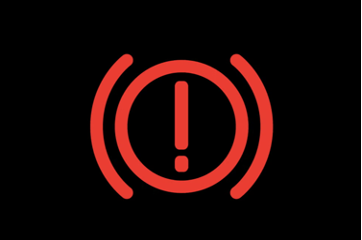
In the event that this indicator light turns on, there’s something amiss with your brakes. It could be something easily changed, like an active parking brake, or something more serious, like worn-out brake pads. Check to see if your parking brake is engaged, and, if not, bring your vehicle in immediately. Your brake system is incredibly necessary for safe driving, so don’t risk going on the road without getting your brakes checked.
Traction/Stability Control
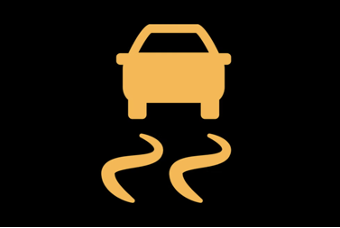
The lines showing a skidding vehicle are what this light is trying to help you avoid. The illumination of this light means that the traction and stability control system is activated, either by snowy or rainy conditions or by other slippage of your wheels. If it remains on, there may be an issue with a sensor or other part of the system, in which case you should bring your vehicle in for a diagnostic check-up.
Airbag Warning

As you know, your vehicle likely has airbags that deploy in the event of a crash. When this indicator light turns on, it can indicate a few things, including issues with the airbag sensor system. If the sensor system is malfunctioning, your airbags may not deploy when they are needed. If this light pops up on your dashboard, it’s essential to take your car in to make sure your system is functioning properly.
Lamp Out
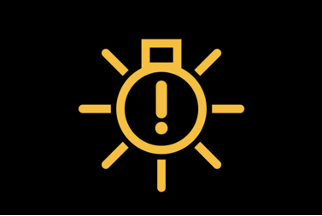
Should this indicator light turn on, a light in your headlamp or taillight may be burned out or broken. This could mean a pretty pricey ticket if you don’t get it fixed, so bring your vehicle in for service at CarShop to get the bulb replaced.
Paying attention to your warning lights is a key element of safe driving, and now that you know what many of them mean, you can feel empowered to do what’s needed to take care of them. Doing so promptly can save you on costly repairs and ensure you’re driving safely.
When a warning light comes on, and it's time to bring your vehicle in for service, CarShop is here for you, no matter where you purchased your vehicle. Our ASE-certified technicians are trained to handle your vehicle with expertise and care and are ready to help you get your vehicle back on the road.

